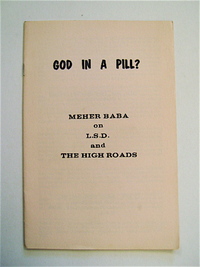- Joined
- Mar 9, 2005
- Messages
- 33,317
It was later revealed the monk had palmed the LSD and conned Ram Dass into seeing him as some kind of fucking superhero (a lot of these monks/holy men are adept at sleight of hand - it's an effective way of convincing some people of your "holy powers". If you took David Copperfield to some village in India he'd be worshipped as a God)
Do I detect a hint of racism there? To say that Indian villagers would assume David Copperfield would be a "god" is a bit of an indictment on Indian people themselves. Once again, you need to avoid generalising. The spiritualty of Hinduism is probably the closest drug-free access to the Divine. Its not bound to the cosmology of a people or geography; the avatars are what Jung would call archetypes, and many psychedelic substances closely tie into these shared-memories. In my experience at least....
Ismene said:Psychedelics are their own path - trying to say mediation is the same thing is disrespectful to psychedelics. It's usually people who have some kind of anti-drug stick up their ass. "Psychedelics arn't as good as doing it naturally with Buddhism". I think psychedelics are far, far more spiritual than man-made ideas like Buddhism.
Now you've switched religions; Ram Daas ascribed to Hindu beliefs. The two systems; Hinduism and Buddhism only share a spacial compnonent. They are as disimilar as Islam is to christianity.
The thing with Buddhism is that its not neccesarily something constructed for the western mindset- we are so used to being attached to our ego's, and therefore sufferring, that we may need a psychedelic material to actualise the peace we may crave for. Buddhism and its beliefs are pretty strange to many people; how does one cease attachment to things/people? I can't shed my love for Miss Willow simply to remove potential sufferring; well, its not "I can't" but "I won't".
That said, to think that psychedelics are less spiritual is to demean the truth of them. They are a direct route to the spirit-centres; but these spirit-centres are the same as the place that meditative practise accesses. Both practises, tripping or plain old trance, take different directions to get to the same place.
On topic- the closest experiences I have had to psychedelics, which did not involve them, has been what could be called ceremonial magik. One particular practise stands out; the repetitive, complex Lesser Banishing Ritual of the Pentagram. Sounds corny, yes- and there is an element of embarassment in it (what the fuck am I doing, chanting in broken eneochian "script", whilst circulating an "altar"???? :D), but the effects of what is essentially a directed meditation and the willing summoning of spirits/daemons/archetypes actually does effect the mind strongly- I have been present, and taken part in, such ceremonies, and the world basically vanishes. Whats left is the holographic thought patterns closesly resembling DMT- everything is everywhere, and these "spirits" are also everywhere and always everywhere.
Though this ritual (which is similar to chanting the rosary or mantra) I have seen a humble bedroom change into a massive, grey arena of sorts with a definte, alien prescence. That, and other odd happenings, has lead me to draw back from ritualistic 'magik', and learn a bit more about what I am seeing and feeling. I am a lucid dreamer, and have been really diving into what might very well be the Truth. Astral projection; whilst pretty different to what I thought it would be like, is defintely a form of "entheogenic" meditation; entheogenic in that you can touch the inner divinity and all senses are immersed in a very real experiece.
Plain pryanyama meditation and gentle yoga as a daily practise is incredibly potent in the mental alterations that come; the calmness, centredness, fullness lasts longer then any psychedelic drug. The neural changes (whatever they are) stick, as opposed to psychedelic changes; which fade or diminsh.

